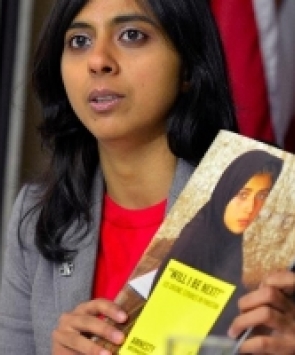
Naureen Shah
Naureen Shah is the Senior Director of Campaigns at the U.S. section of Amnesty International. She manages Amnesty International’s work to respond to crisis, including developments arising from conflicts, coups, and rapid political changes. She also manages the U.S. section of Amnesty International's work to advance human rights in the face of a global refugee crisis and attacks on free expression and human rights activists. She conducts advocacy with Congress, the UN, the White House, federal agencies, and regional human rights bodies. She has appeared on MSNBC, CNN, the BBC, PRI’s The World, and several radio outlets. Her analysis has recently been cited in coverage by the New York Times, Washington Post, LA Times, and Reuters, among other outlets. Naureen holds a B.S. from Northwestern University’s Medill School of Journalism, cum laude. She holds a J.D. from Columbia Law School, where she was a James Kent Scholar and Harlan Fiske Stone scholar, and received the Lowenstein Fellowship awarded to outstanding graduates pursuing public interest law.
What human rights work are you currently involved in?
Until recently, I have covered human rights abuses committed in the name of national security, specifically human rights abuses committed by the U.S. government. My work with the Security and Human Rights program focused especially on the closure of Guantanamo Bay and fighting the Muslim ban, in addition to working against the use of torture and surveillance as tools of the state, ending secrecy around the use of drones in situations of war, and ensuring that the U.S. government’s use of lethal force is compliant with international laws and standards. In response to President Trump's executive order, for example, we held a briefing for Congressional staff to highlight the impact it would have on refugees. A link to the video can be found here.
In what ways were you involved in human rights during your time at Columbia Law School?
While at Columbia Law School, I was an articles editor at the Human Rights Law Review and worked on a special issue that we had on the war on terrorism. I was a member of the Columbia National Lawyers Guild chapter, and I researched with Peter Rosenblum, who was the Lieff Cabraser Clinical Professor of Human Rights and Faculty Co-director of the Human Rights Institute. Otherwise, I interned almost every semester of law school with organizations such as the Legal Aid Society, Amnesty International USA, the American Civil Liberties Union, and the Center for Constitutional Rights. I also participated in the Human Rights Internship Program, traveling to Capetown to work on refugee issues. Additionally, I was the recipient of the Sidley-Austin Fellowship and the Lowenstein Enhanced Loan Repayment Assistant Program Fellowship. After law school, I received the Human Rights Watch Sandler Fellowship, for which I researched in the London office’s Asia division and produced a report on abuse, torture, discrimination, and extrajudicial killings by police forces in India.
What motivates you to be a human rights lawyer?
I went to law school because I was upset with what was happening during the Iraq war and 9/11. I wanted to be more effective in advocating for change and I saw a law degree as bestowing more power and credibility in that world. However, I’ve realized that power doesn’t come from law, it comes from ordinary activists. As a lawyer I can support activists but it’s really about supporting a global human rights movement that started decades ago and will continue for decades to come. Change happens over decades, not years, and if lawyers think of themselves as part of a bigger global movement we can be better allies. Human rights is not really about what happens in courtrooms, rather it’s something that needs to resonate in the minds of ordinary people to give it power. It cannot be a movement of elites.
What advice would you have for students interested in pursuing a career in human rights?
Don’t worry about networking—it’s not going to help your career. Instead, specifically pursue people and organizations you look up to. If you have the opportunity and are financially able to work with them for free, do so. After law school, if it’s financially possible for you to take the risk to work in public interest, I truly believe that hard work and persistence will eventually get you to your goals. Find a job that helps you develop the skills you will need for the job you want. It’s not about having your dream job in the first five years. And even if you don’t get ‘the’ job, you should take a position that allows you to be true to yourself. Ultimately this is a marathon, not a sprint. If you commit yourself to that marathon, you’ll be in it. This industry desperately needs new young lawyers and thinkers.

